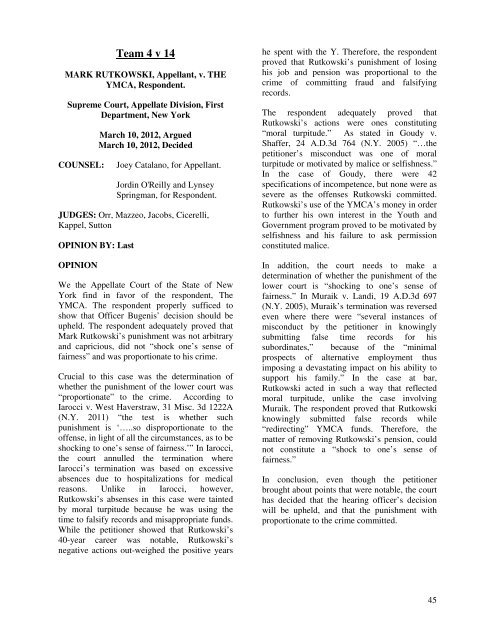2012 Conference Executive Record Report.pdf - YMCA of Greater ...
2012 Conference Executive Record Report.pdf - YMCA of Greater ...
2012 Conference Executive Record Report.pdf - YMCA of Greater ...
You also want an ePaper? Increase the reach of your titles
YUMPU automatically turns print PDFs into web optimized ePapers that Google loves.
Team 4 v 14<br />
MARK RUTKOWSKI, Appellant, v. THE<br />
<strong>YMCA</strong>, Respondent.<br />
Supreme Court, Appellate Division, First<br />
Department, New York<br />
COUNSEL:<br />
March 10, <strong>2012</strong>, Argued<br />
March 10, <strong>2012</strong>, Decided<br />
Joey Catalano, for Appellant.<br />
Jordin O'Reilly and Lynsey<br />
Springman, for Respondent.<br />
JUDGES: Orr, Mazzeo, Jacobs, Cicerelli,<br />
Kappel, Sutton<br />
OPINION BY: Last<br />
OPINION<br />
We the Appellate Court <strong>of</strong> the State <strong>of</strong> New<br />
York find in favor <strong>of</strong> the respondent, The<br />
<strong>YMCA</strong>. The respondent properly sufficed to<br />
show that Officer Bugenis’ decision should be<br />
upheld. The respondent adequately proved that<br />
Mark Rutkowski’s punishment was not arbitrary<br />
and capricious, did not “shock one’s sense <strong>of</strong><br />
fairness” and was proportionate to his crime.<br />
Crucial to this case was the determination <strong>of</strong><br />
whether the punishment <strong>of</strong> the lower court was<br />
“proportionate” to the crime. According to<br />
Iarocci v. West Haverstraw, 31 Misc. 3d 1222A<br />
(N.Y. 2011) “the test is whether such<br />
punishment is ‘…..so disproportionate to the<br />
<strong>of</strong>fense, in light <strong>of</strong> all the circumstances, as to be<br />
shocking to one’s sense <strong>of</strong> fairness.’” In Iarocci,<br />
the court annulled the termination where<br />
Iarocci’s termination was based on excessive<br />
absences due to hospitalizations for medical<br />
reasons. Unlike in Iarocci, however,<br />
Rutkowski’s absenses in this case were tainted<br />
by moral turpitude because he was using the<br />
time to falsify records and misappropriate funds.<br />
While the petitioner showed that Rutkowski’s<br />
40-year career was notable, Rutkowski’s<br />
negative actions out-weighed the positive years<br />
he spent with the Y. Therefore, the respondent<br />
proved that Rutkowski’s punishment <strong>of</strong> losing<br />
his job and pension was proportional to the<br />
crime <strong>of</strong> committing fraud and falsifying<br />
records.<br />
The respondent adequately proved that<br />
Rutkowski’s actions were ones constituting<br />
“moral turpitude.” As stated in Goudy v.<br />
Shaffer, 24 A.D.3d 764 (N.Y. 2005) “…the<br />
petitioner’s misconduct was one <strong>of</strong> moral<br />
turpitude or motivated by malice or selfishness.”<br />
In the case <strong>of</strong> Goudy, there were 42<br />
specifications <strong>of</strong> incompetence, but none were as<br />
severe as the <strong>of</strong>fenses Rutkowski committed.<br />
Rutkowski’s use <strong>of</strong> the <strong>YMCA</strong>’s money in order<br />
to further his own interest in the Youth and<br />
Government program proved to be motivated by<br />
selfishness and his failure to ask permission<br />
constituted malice.<br />
In addition, the court needs to make a<br />
determination <strong>of</strong> whether the punishment <strong>of</strong> the<br />
lower court is “shocking to one’s sense <strong>of</strong><br />
fairness.” In Muraik v. Landi, 19 A.D.3d 697<br />
(N.Y. 2005), Muraik’s termination was reversed<br />
even where there were “several instances <strong>of</strong><br />
misconduct by the petitioner in knowingly<br />
submitting false time records for his<br />
subordinates,” because <strong>of</strong> the “minimal<br />
prospects <strong>of</strong> alternative employment thus<br />
imposing a devastating impact on his ability to<br />
support his family.” In the case at bar,<br />
Rutkowski acted in such a way that reflected<br />
moral turpitude, unlike the case involving<br />
Muraik. The respondent proved that Rutkowski<br />
knowingly submitted false records while<br />
“redirecting” <strong>YMCA</strong> funds. Therefore, the<br />
matter <strong>of</strong> removing Rutkowski’s pension, could<br />
not constitute a “shock to one’s sense <strong>of</strong><br />
fairness.”<br />
In conclusion, even though the petitioner<br />
brought about points that were notable, the court<br />
has decided that the hearing <strong>of</strong>ficer’s decision<br />
will be upheld, and that the punishment with<br />
proportionate to the crime committed.<br />
45
















